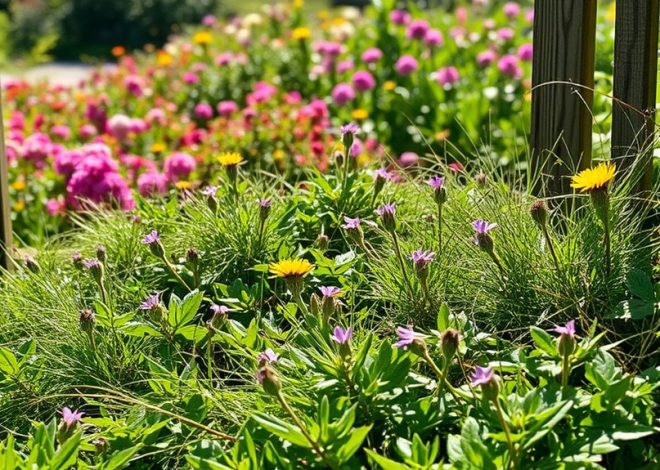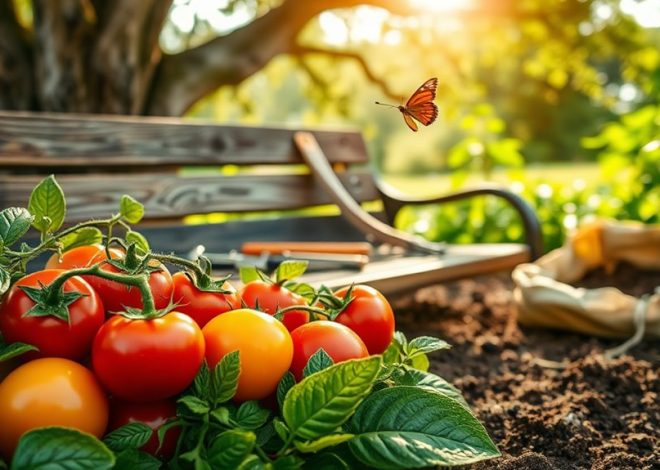
Why I Only Garden Organically (And You Might Want To, Too)
Why I Only Garden Organically (And You Might Want To, Too)
Did you know that organic gardening can yield up to 30% more nutrients in your produce compared to conventionally grown foods? This isn’t just about better health; it’s a pathway to a more sustainable lifestyle. By choosing organic, you’re not only investing in your well-being but also in the environment. Curious about how this choice can transform your garden and life? Let’s explore the many compelling reasons to embrace organic gardening together.
Key Takeaways
- Organic gardening provides nutrient-rich produce free from harmful pesticides, promoting better health for you and your family.
- It fosters environmental sustainability by reducing chemical runoff and enhancing soil health, benefiting local ecosystems.
- Gardening organically supports biodiversity, attracting pollinators and beneficial insects that contribute to a thriving garden.
- By minimizing chemical exposure, organic gardening creates a safer environment for pets and children to play and explore.
- Building soil health naturally through organic practices improves nutrient levels and promotes a resilient ecosystem for future generations.
The Health Benefits of Organic Gardening
Have you ever considered how organic gardening can enhance your health?
The benefits of organic gardening go beyond just fresh produce.
When you grow your own food, you gain access to nutrient-rich fruits and vegetables, free from harmful pesticides and chemicals.
This means fewer toxins in your body, which can lead to better overall health.
Plus, digging in the dirt and nurturing plants can reduce stress, boost your mood, and improve mental clarity.
You’ll also enjoy physical activity while gardening, promoting a healthier lifestyle.
Embracing organic gardening connects you to nature and fosters a profound sense of well-being. Additionally, organic gardening supports environmental sustainability, ensuring a healthier planet for future generations.
Environmental Sustainability and Organic Practices
While many people focus on the personal benefits of organic gardening, it plays a crucial role in promoting environmental sustainability as well.
By avoiding synthetic pesticides and fertilizers, you’re reducing chemical runoff that pollutes our waterways. Organic practices enhance soil health, fostering a rich ecosystem beneath your feet. Essential habits like crop rotation and composting further contribute to sustainable gardening by improving biodiversity and soil quality.
Healthier soil captures more carbon, combating climate change. Plus, you’re conserving water through organic methods that improve moisture retention.
When you choose organic, you’re not just nurturing your plants; you’re also investing in a sustainable future for our planet. Your garden becomes a thriving, eco-friendly space that supports life in all forms.
Enhancing Biodiversity in Your Garden
How can you transform your garden into a vibrant sanctuary that supports a diverse array of life?
Start by planting native species, which provide food and habitat for local wildlife.
Incorporate a variety of plants—flowers, shrubs, and trees—to create layers and attract different pollinators.
Add water features like a small pond or birdbath to invite aquatic life and birds.
Create compost heaps and leave some areas wild to encourage beneficial insects.
By embracing companion planting, you can naturally deter pests and enhance plant health.
Every step you take toward biodiversity nurtures the ecosystem, making your garden a thriving haven for all. Additionally, consider including water features such as ponds or birdbaths to attract more wildlife to your garden.
Reducing Chemical Exposure
By choosing organic gardening, you minimize the harmful pesticides and fertilizers that can leach into the soil and water systems. These chemicals not only affect your plants but can also pose risks to your health and the environment. You’ll create a safer space for your family and pets while supporting beneficial insects and wildlife. Embracing organic methods encourages natural pest control and promotes a thriving ecosystem. Plus, you’ll enjoy the peace of mind that comes from knowing your homegrown produce is free from toxic residues. It’s a win-win for you and the planet!
Building Soil Health Naturally
What if the secret to a thriving garden lies beneath your feet? Building soil health naturally is your key to success.
Start by enriching your soil with organic matter like compost, which boosts nutrient levels and improves structure.
Incorporate cover crops to prevent erosion and enhance microbial activity.
Earthworms and beneficial insects will thrive, creating a balanced ecosystem.
Practice crop rotation to prevent nutrient depletion and pest buildup.
Avoid synthetic fertilizers; they can harm soil life.
Instead, embrace natural amendments like bone meal or kelp. Additionally, consider soil testing to better understand your soil’s needs and tailor your amendments accordingly.
The Joy of Growing Your Own Food Organic Way
Growing your own food organically not only means enjoying fresher, healthier produce, but it also connects you to the earth in a meaningful way. You’ll savor the difference in flavor while knowing you’re making a positive impact on the environment. Embracing organic gardening fosters a deeper awareness of sustainability and the importance of nurturing our planet. Additionally, effective techniques such as composting and crop rotation can significantly enhance soil health and biodiversity in your garden.
Healthier Produce Benefits
When you cultivate your own organic garden, you’re not just planting seeds; you’re nurturing the potential for fresher, tastier, and more nutrient-rich produce.
Organic methods enhance soil health, allowing plants to absorb essential nutrients more effectively.
You’ll notice a vibrant flavor in your tomatoes, greens, and herbs—something store-bought items often lack.
Plus, growing your own food means you control what goes into your meals, avoiding harmful pesticides and chemicals.
The joy of harvesting your own organic fruits and vegetables translates into better health for you and your family, making each bite a celebration of nature’s bounty and pure goodness.
Environmental Impact Awareness
The joy of cultivating your own organic garden goes beyond just enjoying fresh produce; it also fosters a deeper connection with the environment.
When you choose organic methods, you’re not only avoiding harmful chemicals but also promoting biodiversity. By nurturing beneficial insects and enriching the soil, you’re creating a thriving ecosystem.
You’ll notice how your garden attracts pollinators, which play a critical role in food production. This awareness of environmental impact extends to reducing your carbon footprint, as you’re growing food closer to home.
Each seed you plant becomes a step toward sustainability, making your gardening journey both fulfilling and responsible.



